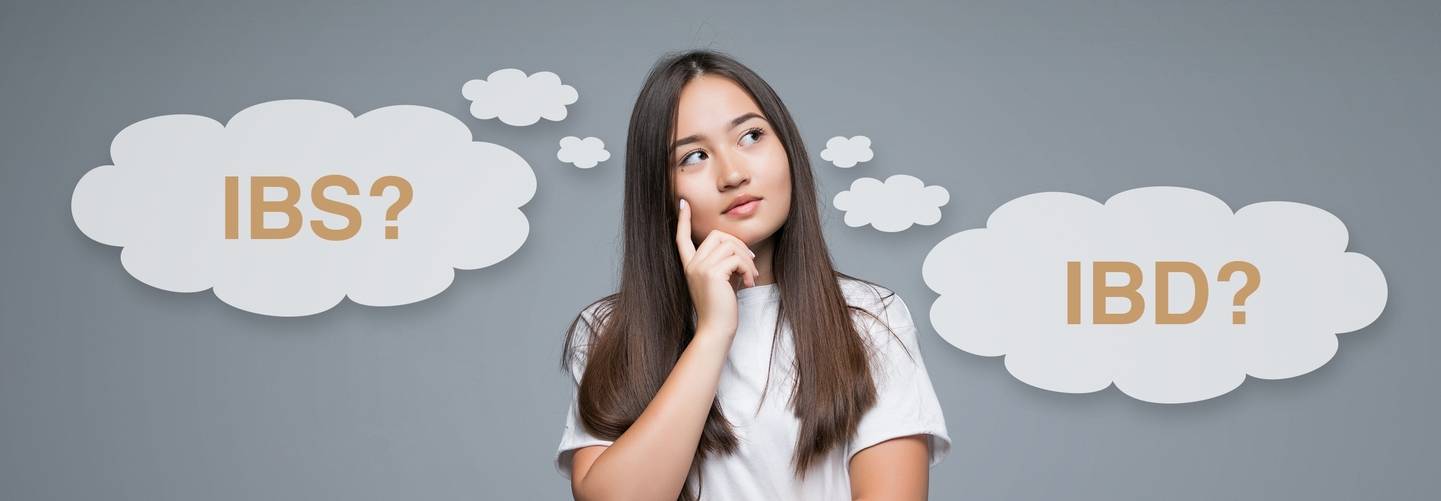
09 Jun IBS vs IBD: knowing the difference
IBS vs IBD: knowing the difference
By Island Hospital | June 9, 2025 4:04:07 PM
It’s easy to confuse Irritable Bowel Syndrome (IBS) and Inflammatory Bowel Disease (IBD). Both of them are abbreviated and sound the same, and both have the word ‘bowel’.
Both conditions affect the bowel and share common symptoms such as abdominal pain and diarrhea.
While these two conditions share similarities, they are two distinct conditions that are treated differently.
Knowing the difference could help you make a more informed decision about when to seek treatment, especially if your symptoms indicate that you may have IBD.
IBD is known to be the more severe of the two conditions if left untreated, as it can cause damage to the digestive system.
What is Irritable Bowel Syndrome (IBS)?
Irritable Bowel Syndrome (IBS) is a disorder that affects the large intestine, with little known about its causes or cures. Fortunately, it is a benign condition that does not lead to serious health complications.
IBS patients may experience diarrhoea, constipation, or alternating bouts of both diarrhoea and constipation. Abdominal discomfort, constipation, or diarrhoea are usually caused by contractions in the bowel wall.
A slow contraction causes constipation, while a long-lasting one causes diarrhoea. A sensitive bowel wall also sends faulty signals to the brain,
This can cause more intense pain than a normal stomach ache as a result of the body overreacting to the symptoms. Frequent passing of gas / excess gas is also a common symptom of IBS.
What is Inflammatory Bowel Disease (IBD)?
Inflammatory Bowel Disease (IBD) is a gastrointestinal disorder commonly associated with abdominal pain, diarrhoea, and rectal bleeding, causing weight loss and nutritional deficiencies such as iron deficiency anaemia (due to blood loss).
Patients with IBD may also experience bloody diarrhoea and an increased urgency in their bowel movements.
There are two types of IBD, one known as ulcerative colitis (UC) and another called Crohn’s disease.
A patient with ulcerative colitis typically experiences inflammation only in the colon and large intestine. In contrast, a patient with Crohn’s disease may experience inflammation involving more than just the intestine, it could affect any part of their digestive system, from the mouth to the anus.
If you notice any concerning signs, consult your healthcare provider for early prevention.
What causes Irritable Bowel Syndrome (IBS)?
The precise cause of Irritable Bowel Syndrome (IBS) is not fully understood; it may be attributed to a problem in the nerves that connect the brain and stomach, or an imbalance of gut bacteria.
While it is difficult to know what causes it, it is easier to find out what triggers a person’s symptoms and help them manage their IBS effectively.
Several factors are linked to IBS symptoms, including muscle contractions, nervous system abnormalities, and stress.
- Food
While IBS is not necessarily caused by a specific diet or food allergy, many people experience their symptoms worsening when consuming certain types of food or beverages.
Common examples include foods that stimulate the stomach and bowel, such as coffee, tea, acidic fruits, and dairy products. To prevent symptom aggravation, your doctor will help identify trigger foods for your IBS and suggest dietary alternatives.
- Hormones
Women have a higher rate of experiencing IBS compared to men, especially during menstrual periods, where patients may experience IBS symptoms concurrent with their period.
- Nervous system abnormalities
Abnormalities in the nerves connecting the brain and intestines may cause increased discomfort or pain when food or gas passes. Poorly coordinated signals lead to hypersensitivity, resulting in stronger pain, diarrhoea, or constipation.
- Muscle contractions
When food moves through your digestive tract, the muscles of the intestinal walls contract and expand accordingly. Strong contractions can cause diarrhoea, while weak contractions slow the passage of food, leading to constipation and bloating.
- Stress
People with IBS often experience worsened symptoms during periods of stress. Stress is known to cause gastrointestinal reactions and may also aggravate the hypersensitive connection between the stomach and the brain.
However, stress is not the cause of symptoms; it only makes them occur more frequently or intensifies them.
Learn more details about the disease in this article on Irritable Bowel Syndrome (IBS)
What causes Inflammatory Bowel Disease (IBD)?
Similar to IBS, IBD is a disorder with an unknown cause. Inflammation occurs when the immune system triggers a response in the body to combat threats.
When the response lingers and does not subside, the inflammation also persists, developing into chronic inflammation.
IBD is an autoimmune disorder, meaning the inflammation in IBD patients is caused by the body’s immune system attacking harmless bacteria in the gut. What exactly causes their body to behave that way in the first place is still unknown.
There is also a genetic predisposition involved in IBD, as patients are at a higher risk of developing IBD if their family members have the disorder.
Inflammatory Bowel Disease differs from Coeliac disease, another autoimmune disease, in which the immune system mistakenly attacks the body.
When a person with Coeliac disease consumes gluten, their body responds by attacking the small intestine, resulting in inflammation.
The cause of inflammation in Coeliac disease is specific, whereas the cause of inflammation in IBD remains unknown.
What’s the treatment for Irritable Bowel Syndrome (IBS)?
Treatment for IBS puts emphasis on relieving symptoms so you can live as close to a good and healthy life as possible without triggering your condition. A personalised treatment plan will be created for you, as the disorder affects everyone differently.
While each person has a different experience with foods that trigger IBS, here are some common triggers that you can take note of:
- Oily and high-fat foods
Foods that are low in fibre can exacerbate constipation in IBS patients. Your doctor may recommend increasing fibre in your diet.
However, an increased fibre intake can also result in bloating. Hence, it depends on how each person’s body reacts to their diet.
- Caffeine
Caffeine is known to stimulate the intestines, which may aggravate IBS symptoms.
- Processed foods
Processed foods can also worsen constipation in IBS patients.
- Dairy products
Milk can be a trigger for IBS symptoms, even if the person is not lactose intolerant.
- Cabbages, broccoli, beans, and onions
Certain vegetables or foods that cause bloating may worsen symptoms.
It is recommended to keep track of the food you eat and monitor your symptoms, as this will make it easier for your doctor to help you develop a plan with the least restrictions on your daily life.
As an alternative, your doctor may recommend a FODMAP (fermentable oligosaccharides, disaccharides, monosaccharides, and polyols) diet. FODMAPs are carbohydrates that resist digestion, which makes them a common cause of digestive issues in individuals with IBS. This will help reduce bloating, gas, and pain.
Stress management is also a key part of treatment, as individuals with IBS have been known to suffer from mental health issues such as depression or anxiety. Surgery is not required for patients with IBS.
What will your appointment be like? Find the answers in our Gastroenterology FAQ.
What’s the treatment for Inflammatory Bowel Disease (IBD)?
Treatment for IBD focuses on reducing inflammation that causes symptoms, ultimately leading to symptom relief and a reduced risk of other complications.
Anti-inflammatory drugs will be administered to help reduce the inflammation in your digestive system. The medicine you take will depend on the location of the inflammation.
It is best to consult your doctor before buying any drugs on your own, as some patients can have their symptoms worsen with the wrong drug. Always check with your doctor first.
Immune system suppressors, also known as immunosuppressants, are medications that inhibit the immune response in the digestive system, thereby reducing the chemicals that trigger inflammation. As the name implies, immunosuppressants will suppress your immune system.
Therefore, you may be more susceptible to diseases and infections. The drugs may also produce side effects such as headaches or nausea, so it is recommended to consult your doctor so he/she can prescribe suitable drugs for your condition.
Biologics, also known as biological medicines, are another class of treatments that have been effective in IBD treatment in recent years. Biologics are antibodies that target specific proteins and stop those proteins from causing inflammation.
Unlike immunosuppressants, biologics only target the specific proteins that have been identified to cause IBD-related inflammation and do not affect the entire body’s immune system.
Surgery is considered a last-resort option for patients with IBD if none of the above treatment options relieve their symptoms and their condition persists or grows in severity.
With the advancement of medicine, surgery is typically unnecessary and is only reserved for the most severe of IBD cases.
The type of surgery carried out will vary depending on the type of IBD the patient has.
- For patients with ulcerative colitis, surgery will be carried out to remove the patient’s colon and also the rectum if needed. The surgery not only treats ulcerative colitis but also eliminates the risk of colon cancer.
- Patients with Crohn’s disease may go through surgery to remove the inflamed parts of their digestive system and also relieve their symptoms. The type of surgery depends on the part of the body that is affected by inflammation.
Find and get the best treatment for your digestive health issues by scheduling an appointment today!
Having constipation? Learn why it possibly happens in this article on 8 Common Digestive Conditions You Might Be Experiencing.
FAQ
When should I seek medical attention for persistent abdominal pain, diarrhoea, or vomiting?
When your abdominal pain, diarrhoea, or even vomiting is prolonged over days or weeks, you should seek medical help from a gastroenterologist. Patients with IBS will have their bowel habits change frequently, experiencing a mix of diarrhoea and constipation depending on their symptoms.
What should I do if I have black, tarry stools and blood in my stool?
Bleeding when passing stool will vary depending on the location. If the blood originates from the upper digestive tract, the stool will likely appear black, giving it a tar-like consistency.
This indicates ulcers or irritation in parts of your stomach or oesophagus, around the upper digestive tract. It could be a sign of blood complications in the digestive system, which demands urgent medical attention.
What does bright red blood in my stool indicate in IBD, and what other symptoms should I expect?
Individuals with IBD may occasionally experience bright red blood in their stools, which can be attributed to varying levels of inflammation and bleeding. They will also experience a severe urgency to go to the toilet at times when the disorder flares up, combined with very severe abdominal cramp/pain and diarrhoea that may be bloody.
Is it urgent for me to seek help immediately if there is blood in my stools or vomit?
Frequent symptoms may occur from time to time, even if the pain is not severe. Although your symptoms may not be intense enough to significantly interfere with your daily life, persistent symptoms that occur every few days or weeks are still worth consulting a doctor about.
It is safer for individuals to identify and learn how to manage their condition early on before their risk of other diseases increases. This is especially true for patients who have IBD, as the inflammation can lead to several other serious complications, such as intestinal bleeding, bowel rupture, colon cancer, and even arthritis.
Is it okay that I’ve been healthy, even though my symptoms haven’t been present for a while?
An IBS patient will learn more about their condition by consulting their doctor, as different triggers can cause symptom recurrence. A good health period for an IBS patient is a relief when they manage their condition and triggers effectively.
IBD is a different case, as it is a chronic disease. There will be a period during which its symptoms will “deactivate,” with no pain or complications, followed by a period where the inflammation flares up and the symptoms return.
Regardless of whether your disorder is currently active or not, it is better to consult a gastroenterologist so you can have a better idea of your condition and learn not to make it worse.
Don’t Wait Until It’s Too Late – Safeguard Your Health Today

We’re offering our comprehensive Executive Health Screening Package at only RM760 – giving you a complete head-to-toe health assessment for peace of mind.
Our package features vital health screenings, including Cardiovascular Assessment, Full Blood Picture, Radiological Screening, Diabetes Screening, Kidney Function Test, and much more.
What’s Included in Your Screening Experience:
✔ Physical examination
✔ Complete medical report
✔ Consultation by Health Screening Physician/Specialist
✔ Choice of light refreshments
✔ Exclusive Island Hospital woven bag







